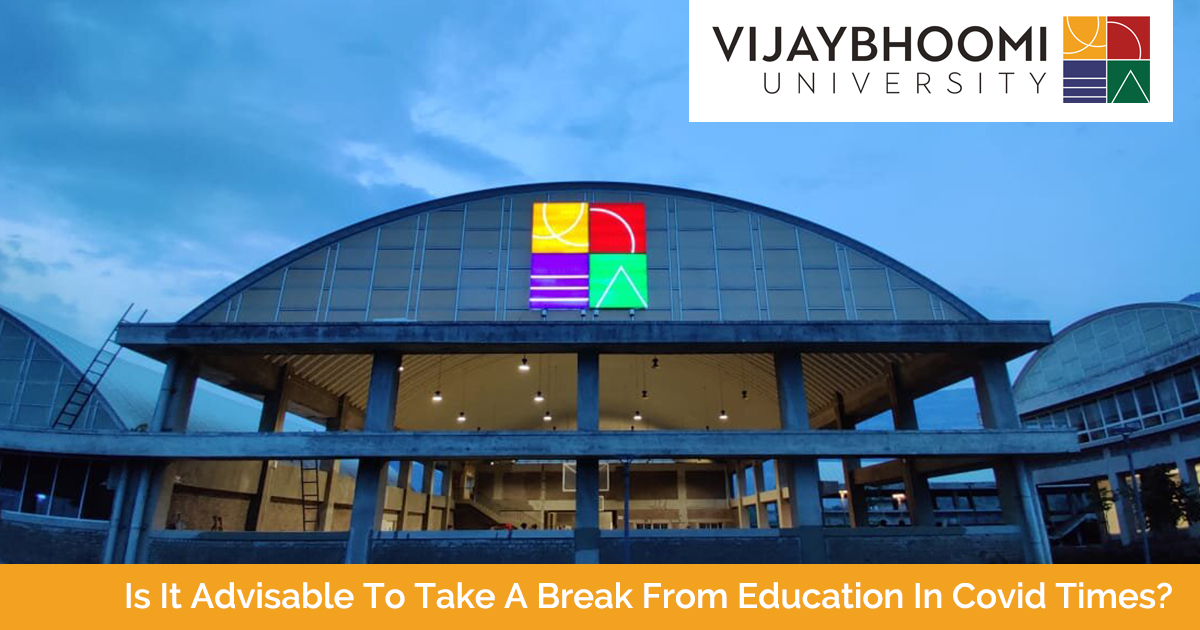Atish Chattopadhyay
Vice Chancellor, Vijaybhoomi University
One should not as the opportunity costs of giving up a year are too high.
These are uncertain times for both students and parents. Many students have not got the opportunity to attend classes on campus for more than one year now. Across India, prospective and current college students are anticipating one more year of online only access to education. According to The Remote Learning Reachability report, by UNICEF, only 24 percent of households in India have internet connections to access e-education, and there is a large rural-urban and gender divide. This is likely to have resulted in widening the learning gap across high, middle, and low-income families. A NCERT survey with over 34,000 participants including students, parents, teachers, and school principals from Kendriya Vidyalayas, Navodyaya Vidyalayas and CBSE-affiliated schools had revealed that at least 27 per cent students do not have access to smartphones or laptops to attend online classes.
Given the above facts, the question remains whether the school-leaving Board Examinations would be the correct assessment of learner potential for admission to colleges?
Own selection process
Universities must explore ways of onboarding students using their own selection process and commence the programme as per calendar without depending on the results of the board exams. This is a good opportunity for higher education institutions to reduce their dependence on board examinations and national level entrance tests. Innovative and new age universities must take a lead to make this happen and reduce the uncertainty for both students and parents.
Some students may consider a temporary withdrawal from school for a ‘gap year,’ postpone appearing for board examinations and seek college admissions in the next academic year. Others may consider a ‘gap year,’ given the possibility of missing out on face-to-face, personalised classroom instruction. Both the reasons mentioned above, to my mind, are bad reasons for taking a gap year.
Cost of a ‘gap-year’
There is no denying the fact that in-person instruction in a campus is both valuable and desirable, but a gap year is costly. However, online learning, if imparted well, can be effective and given the vaccination drive, the campuses may open sooner than one is expecting today. Historically, one of the reasons students take a gap year is to enrich themselves with life experiences and gain maturity that can make the following years of study richer and more valuable. A virtual gap year, waiting for the pandemic to go, does not bring any benefits. Also, a gap year comes with substantial costs.
The most significant disadvantage of a ‘gap year’ is the cost of entering the workforce a year later. The average starting salary for college graduates with a bachelor’s degree in India is around ₹5 lakh per annum. Not only is this income lost, but also the benefit of one year of work experience. The question one should be asking is not whether face-to-face instruction is more valuable than online instruction, but how one would value that work experience and the earning potential. To me the answer is a no brainer.
Learning outcomes when learning online
Whether online learning is inferior to traditional classroom learning is an empirical question. However, the majority of the studies found no significant difference in learning outcomes when comparing online to traditional courses. Studies have also revealed that the differences in learning outcomes may be attributed to learning design as opposed to the specific mode of delivery. Given the integral role that online learning is expected to play in the future of higher education, institutions are focusing on sound pedagogical quality with consideration for the mode of delivery as means for promoting positive learning outcomes.
Why would anyone ever take a gap year?
To be clear, my recommendation is not to take a gap year. Depending on one’s individual situation and the opportunity, the gap year may very well be worth ₹5 lakh for an undergraduate programme and ₹10 lakhs+ for an MBA in terms of foregone income (plus the cost of the work experience). Both money value and experience value must be individually considered. My position is that one should not take a gap year as institutions will upgrade their pedagogy of online instructions, making learning more engaging. Also, there is a high possibility that the pandemic will end by the time one graduates, which should open more opportunities in terms of career options.
A college education is almost always the best investment one can ever make and never lose.





